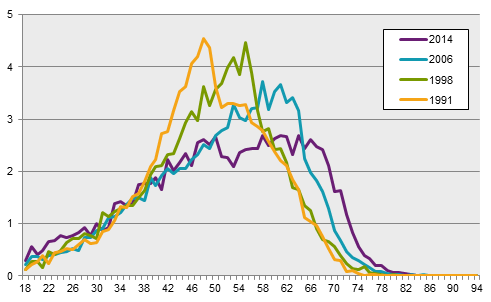Younger members in the Riksdag and municipal council
Statistical news from Statistics Sweden 2015-03-17 9.30
The share of women in the Riksdag decreases while more members are younger. However, the younger and older members are still under-represented among our elected representatives, regardless of political level, compared with the population that is entitled to vote.
In the 2014 election to the Riksdag the trend towards more gender equality in the Riksdag took a turn. For the first time since 1991, the share of women decreased from 45.0 percent in 2010 to 43.6 percent in the 2014 election. At the same time, the share of representatives under age 30 in the Riksdag was at the record level of 10.6 percent, an increase of 5.7 percentage points. The share of representatives age 65 and older in the Riksdag also increased somewhat to 2.6 percent while other age groups decreased. Despite the rise in the share of younger and older Riksdag representatives, these groups are still under-represented in relation to the population of eligible voters, where they comprise 19.0 and 26.0 percent respectively.
The sex and age distribution varies considerably among the parties in the Riksdag. The table below presents the share of women and men among representatives by party, elections 2010 and 2014.
| 2010 | 2014 | |||||
| Men | Women | Number seat(s) |
Men | Women | Number seat(s) |
|
| Moderaterna | 52,3 | 47,7 | 107 | 47,6 | 52,4 | 84 |
| Centerpartiet | 69,6 | 30,4 | 23 | 59,1 | 40,9 | 22 |
| Folkpartiet | 58,3 | 41,7 | 24 | 73,7 | 26,3 | 19 |
| Kristdemokraterna | 63,2 | 36,8 | 19 | 62,5 | 37,5 | 16 |
| Miljöpartiet | 44,0 | 56,0 | 25 | 52,0 | 48,0 | 25 |
| Socialdemokraterna | 51,8 | 48,2 | 112 | 53,1 | 46,9 | 113 |
| Vänsterpartiet | 42,1 | 57,9 | 19 | 42,9 | 57,1 | 21 |
| Sverigedemokraterna | 85,0 | 15,0 | 20 | 77,6 | 22,4 | 49 |
Of all representatives in the Riksdag, 8.3 percent were born in another country than Sweden, which is a slight increase from 8.0 percent in 2010. Of those who were eligible to vote in the Riksdag election, the share of foreign born persons was 12.0 percent.
More equal and younger municipal council
In the 2014 election, the share of women elected to the municipal council increased somewhat from 43.0 to 43.7 percent. Similar to the Riksdag election, the share of the young representatives increased. The share of representatives aged 18–29 increased from 6.9 to 7.9 percent and the share of representatives aged 30–49 increased from 33.8 to 35.7 percent. Even the oldest age group increased its share, while the group aged 50–64 decreased. If we look at the average age among elected representatives, it has dropped from 51.5 years in the 2010 election to 51.2 years in the 2014 election. However, the youngest and the oldest age groups are still under-represented in relation to the population that is eligible to vote.

After the 2014 municipal council election, the share of representatives who were born in another country than in Sweden was 7.7 percent. The corresponding share was 7.6 percent in the 2010 election. Of those who were eligible to vote in the municipal council election, the share of foreign born persons was 17.0 percent.
Highest level of education among European Parliament representatives
Among those who were elected into the European Parliament in 2014, the largest share has post secondary education. 78.9 percent have post secondary education (information in Statistics Sweden's register is missing for one person), 71.8 percent of Riksdag representatives have a post secondary education, while 62.7 percent of county council representatives and 52.0 percent of municipal council representatives have post secondary education. Among those who were eligible to vote in the different elections, between 33 and 34 percent had post secondary education.
The statistics is published here:
Definitions and explanations
Age pertains to age at the end of the election year.
On 10 May re-election will take place for the municipal council in Båstad municipality. The information that is being presented today can therefore be changed after re-election.
Next publishing will be
Statistics on election participation in the 2014 general elections will be published 2015-03-30 at 09:30.
Statistical Database
More information is available in the Statistical Database
Feel free to use the facts from this statistical news but remember to state Source: Statistics Sweden.
